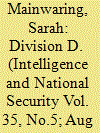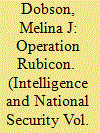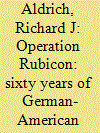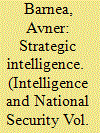|
|
|
Sort Order |
|
|
|
Items / Page
|
|
|
|
|
|
|
| Srl | Item |
| 1 |
ID:
172918


|
|
|
|
|
| Summary/Abstract |
The CIA is a popular topic of study for intelligence historians. Renowned for covert action and human intelligence operations, we know a lot about how they became woven into the tapestry of world history. More recently, scientific and technical intelligence emerged as a central theme, uncovering the work of the ‘Wizards of Langley’. This article suggests we still have much to learn. Exploring CIA’s historic interest in communications intelligence, it uncovers ways they controlled a significant proportion of the world’s communications systems. Working internationally, and disagreeing with NSA, the CIA influenced important systems well into the twenty-first century.
|
|
|
|
|
|
|
|
|
|
|
|
|
|
|
|
| 2 |
ID:
172922


|
|
|
|
|
| Summary/Abstract |
Congress may engage in intelligence oversight by authorizing third-party requesters as ‘fire alarms’ to promote transparency under the Freedom of Information Act (FOIA). FOIA authorizes requesters to sue federal agencies to ensure their cooperation with requests for agency records. This article considers judicial review and the national security scholar’s role as fire alarm oversight by examining the litigation for the Pfeiffer Bay of Pigs CIA operation history, draft volume V. The article illustrates a compliance gap that requesters and courts can close by canvassing the advantages that scholars, especially historians, enjoy in enabling judicial oversight that promotes executive agency transparency.
|
|
|
|
|
|
|
|
|
|
|
|
|
|
|
|
| 3 |
ID:
172924


|
|
|
|
|
| Summary/Abstract |
Intelligence in defence organizations is widely seen as an under-researched topic. This paper assesses this claim and, by means of a metareview, systematically analyses the body of literature that has focused on intelligence in defence organizations between 2009 and 2018. The review includes 13 key journals on intelligence studies (e.g., Intelligence and National Security), military studies (e.g., Small Wars and Insurgencies) and conflict and peace studies (e.g., Journal of Strategic Studies). The analysis provides insight on the focus areas, the timeframes and conflicts that are addressed as well as the authors involved. Based on this, the paper provides suggestions for further research into intelligence within defence organizations.
|
|
|
|
|
|
|
|
|
|
|
|
|
|
|
|
| 4 |
ID:
172920


|
|
|
|
|
| Summary/Abstract |
This article is first to report on the secret European five-partner sigint alliance Maximator that started in the late 1970s. It discloses the name Maximator and provides documentary evidence. The five members of this European alliance are Denmark Sweden, Germany, the Netherlands, and France. The cooperation involves both signals analysis and crypto analysis. The Maximator alliance has remained secret for almost fifty years, in contrast to its Anglo-Saxon Five-Eyes counterpart. The existence of this European sigint alliance gives a novel perspective on western sigint collaborations in the late twentieth century. The article explains and illustrates, with relatively much attention for the cryptographic details, how the five Maximator participants strengthened their effectiveness via the information about rigged cryptographic devices that its German partner provided, via the joint U.S.-German ownership and control of the Swiss producer Crypto AG of cryptographic devices.
|
|
|
|
|
|
|
|
|
|
|
|
|
|
|
|
| 5 |
ID:
172917


|
|
|
|
|
| Summary/Abstract |
Operation Rubicon was probably one of the most successful intelligence operations of our time. Recent press revelations detail this secret partnership between the German Bundesnachrichtendienst (BND) and the American Central Intelligence Agency (CIA), focused on the purchase and control of Crypto AG. Supported by German technical giants like Siemens, the company sold and produced compromised cypher machines. This article challenges the idea that the dominant sigint powers were within the Anglosphere during the Cold War. Instead suggesting Rubicon evidences that the centre of gravity for intelligence lay ‘elsewhere’. It also explores the complex ethical implications of Germany’s involvement in Rubicon.
|
|
|
|
|
|
|
|
|
|
|
|
|
|
|
|
| 6 |
ID:
172916


|
|
|
|
|
| Summary/Abstract |
The story of Operation Rubicon provides a ‘missing link’ in the history signals intelligence. It connects the period of the Second World War, dominated by Bletchley Park and Arlington Hall, with the Snowden era. This special section examines signals intelligence in the latter decades of the twentieth century, arguing that the processes of covert interference that were used help us to understand sources and methods in our present times. It examines new material that has emerged in Europe that expands our comprehension of the intelligence co-operation between the United States, Germany, Switzerland and Sweden, focusing on the control of technology corporations, especially Crypto AG. It argues that, as a result of Operation Rubicon, all states with high-grade computing, even the Soviet Union, were probably secret beneficiaries of this process and derived substantial flow of intelligence as a result, mostly from the global south. However, the task of exploring the material generated by Operation Rubicon has only just begun, since most of the product remains classified.
|
|
|
|
|
|
|
|
|
|
|
|
|
|
|
|
| 7 |
ID:
172919


|
|
|
|
|
| Summary/Abstract |
For over 50 years, America and Germany read much of the world’s communications. With ‘Operation Rubicon’, the CIA and the BND undermined the encryption security of foreign governments by controlling the Swiss technology company, Crypto AG. Puzzlingly, investigative journalists and customers increasingly identified the relationship and the vulnerabilities of their products. Yet, Rubicon continued, producing dividends for over half a century despite repeated revelations. This article asks why? It argues that geopolitical influences on targets, the consumer’s limited resources, and individual brilliance by CIA-BND agents within Crypto AG combined to enable operational longevity – where other sigint operations would have failed.
|
|
|
|
|
|
|
|
|
|
|
|
|
|
|
|
| 8 |
ID:
172925


|
|
|
|
|
| Summary/Abstract |
This research note introduces the December 1981 report of the Security Commission. This report was never released with the main conclusions forming the basis of a statement by Prime Minister Margaret Thatcher, published in May 1982. But the 1981 report is significant for a number of reasons. It was the first major review of government security since the Radcliffe Report of 1961, resulting in a number of recommendations that changed government vetting for the rest of the 1980s. The report also recommended the avowal of Britain’s foreign intelligence agency – a recommendation that proved especially controversial.
|
|
|
|
|
|
|
|
|
|
|
|
|
|
|
|
| 9 |
ID:
172923


|
|
|
|
|
| Summary/Abstract |
Both the discipline of strategic intelligence at the governmental level and the competitive intelligence discipline constitute accepted methods of supporting decision in order to avert mistakes and prevent strategic surprise. So far, research has focused on national intelligence and intelligence in business separately however, it is possible to use experience accumulated in the business field to improve intelligence practice in national security and vice versa . The central innovation of this article is that mutual learning can be utilized in the context of a model that makes a distinction between a ‘concentrated surprise’ and a ‘diffused surprise’ to provide a breakthrough in the intelligence field for better prediction of the development of surprises.
|
|
|
|
|
|
|
|
|
|
|
|
|
|
|
|
|
|
|
|
|